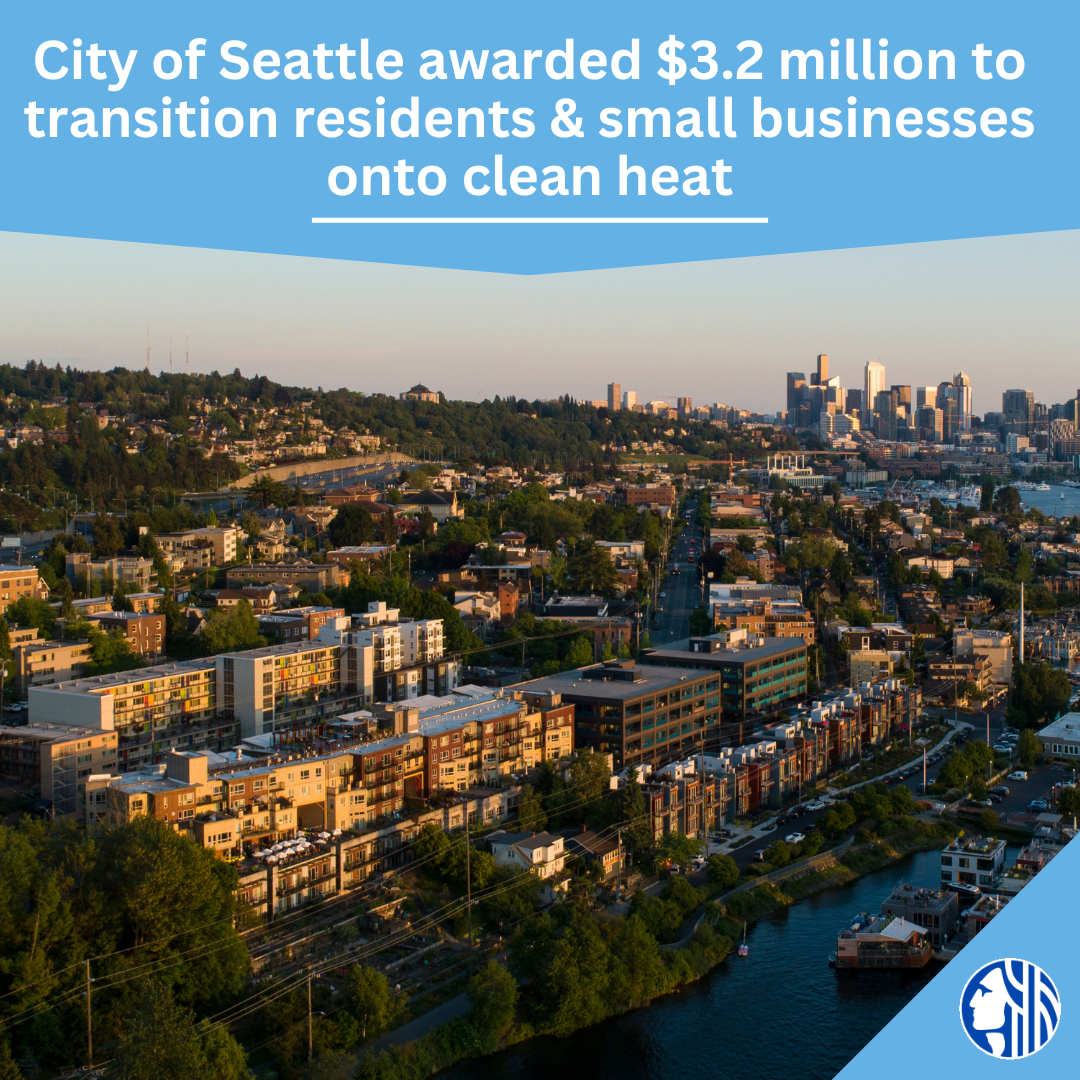
The Washington State Department of Commerce announced a $3.2 million funding award to the City of Seattle as part of the state’s Home Electrification Appliance Rebates (HEAR) grant program.
The funding will augment the City’s existing programs that help households and businesses transition from fossil fuels like oil and natural gas, to clean and energy-efficient electric space and water heating appliances, including heat pumps and heat pump water heaters. City funds, braided with state funds in addition to federal tax credits will help ease the transition for Seattleites and provide benefits such as reduced energy and heating bills, support improved indoor air-quality and provide air-conditioning.
“Building pollution is one of the fastest rising causes of emissions in Washington State. Investing in clean heat can help us combat this crisis and give Seattle’s residents a cleaner, healthier future,”
“By increasing funding for the Clean Heat program, more Seattleites will be able to transition off of oil heating than ever before. This is yet another step in eliminating all oil heat use by 2030 and creating a sustainable future for all Seattle residents.”
Mayor, Bruce Harrell
The City of Seattle will integrate the funding into its existing residential Clean Heat program implemented by the Office of Sustainability and Environment (OSE) and the Office of Housing (OH), and existing Seattle City Light business rebate program:
- The Office of Sustainability and Environment will use approximately $1.2 million to help approximately 250 moderate-income households transition from oil heat to electric heat pumps by boosting rebate amounts from $2,000 to $6,000.
- The Office of Housing will use approximately $1.4 million to help approximately 50 income-qualified households, earning 80% of AMI or less, transition from gas heating to electric heat pumps at no cost. The Office of Housing already helps households convert from oil to heat pumps, so this funding will expand their services to gas-heated homes.
- Seattle City Light will deploy nearly $600,000 to boost their existing rebate amounts for heat pumps and heat pump water heaters for approximately 100-150 small businesses (50 or fewer employees), with outreach support from the Office of Economic Development.
According to the WA State Department of Commerce, building-related emissions are one of the fastest growing sources of pollution in Washington state. Greenhouse gas emissions from the direct combustion of fossil fuels in buildings represent 10% of Washington’s statewide totals. In Seattle, building emissions represent approximately 37% of total city-wide core emissions.
“From heat domes to many days of below freezing temperatures, tens of thousands of Washington residents are put at risk each year by these increasing weather extremes,”
“Investing these Climate Commitment Act funds gives community initiatives like the Seattle’s Clean Heat program more opportunities to help reduce use of fossil fuels and create healthier, more resilient and energy efficient homes and buildings through electrification.”
Commerce Director, Mike Fong
Efficient, electric appliances, such as heat pumps, are a valuable tool in tackling climate change and helping households and businesses adapt to hotter temperatures since they use three to four-times less energy than a traditional oil or gas furnace while also providing air-conditioning. An average household using 500 gallons of heating oil per year can expect to save more than 50% on their heating costs, or approximately $1,100 per year.
The funding is expected to reduce total GHG emissions by at least 20,000 MTCO2e, which is the equivalent of 4,760 gasoline-powered cars taken off the road for a year.
“Since 2017, the City has already helped more than 1,500 households convert from dirty, inefficient heating oil to clean, energy-efficient heat pumps. Not only do these conversions keep residents healthier and more comfortable during climate crises, they also make a huge difference in reducing climate pollution in the residential sector,” said Jessyn Farrell, Director of the Office of Sustainability & Environment. “This is especially important for communities of color who disproportionately experience the negative health outcomes from climate change and other environmental factors such as air pollution.
The City will convert more households to electric heat with the goal of eliminating heating oil use by 2030. The new funding is expected to be deployed this summer through next spring, 2025.
About the WA HEAR Program:
The HEAR program is supported with funding from Washington’s Climate Commitment Act which supports Washington’s climate action efforts by putting cap-and-invest dollars to work reducing climate pollution, creating jobs, and improving public health. More information about the CCA available at www.climate.wa.gov